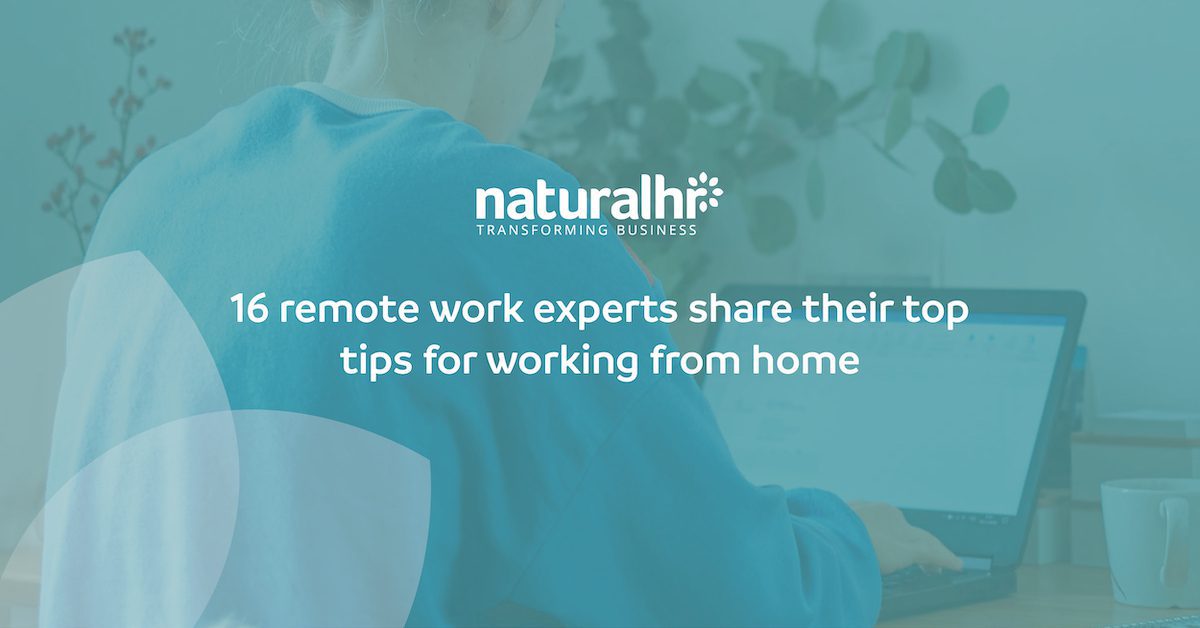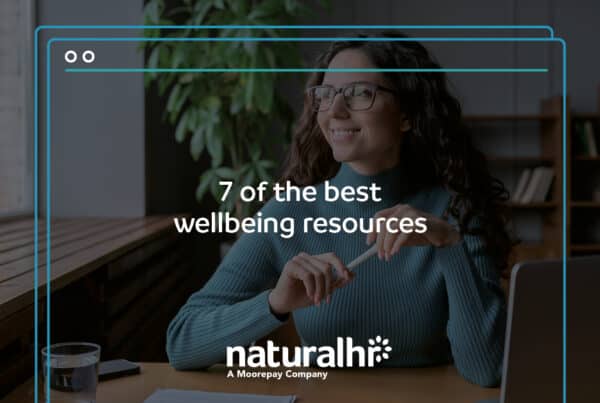
Nearly 15 million of us continue to work from home in the UK as the country weathers the storm that is COVID-19. After almost a year of remote work, it is likely that this is still a very novel way of working for some employees. Whether by default or design, flexible working was not as commonplace in a pre-COVID world as it is in 2021 and adapting to this new normal can take time.
The surge in flexible working has led many organisations to reconsider their flexible working policies entirely. The likes of Shopify, Salesforce and Slack have all implemented policies that will see remote working become the norm with employees transitioning to 100% remote work.
For those of us that are new to the world of remote work, those that have started jobs in lockdown or even for the next generation joining the workforce during these isolated times; finding your ‘mojo’ for productive remote work can be tough.
That’s why we reached out to the remote work community and asked experts, serial WFH’ers and business leaders to share their top tips for effective work from home.
Setting up your workspace
The imposed periods of lockdown have seen many of us without a dedicated study or workspace to create makeshift offices in our homes; from dining tables to dressing tables and even using ironing boards as a desk! The importance of having the right equipment is important, but a poor physical set up can wreak havoc with our bodies, our posture and our ability to concentrate.
Ana Casic and her team at Talent LMS recently conducted a survey of over 1,000 remote workers which found that just 36% have a dedicated home office, with the majority of workers choosing the living room, bedroom or dining room to work from. She stresses the importance of switching up our working environments and seating positions to look after our posture and boost our energy levels: “Working from home has brought new freedom in how we work. While at the office we must spend endless hours in the chair, at home we can shift positions and sit, stand or even lie down while working. So, do your spine a favour and change positions and move around the house frequently. Ditch the chair and work from a kitchen island, bed, floor, or a tall shelf that allows you to stand. Your back and neck will be more relaxed, and you’ll have more energy after the workday.”
An office environment is often one that is conducive to a productive, working mindset. Our homes, however, are our personal spaces – usually where we forget about work to be in the moment with our families. Working from home has effectively blurred the lines between our personal and professional lives, and these two significant parts of our lives are now merged into one.
Robert Winsloe, Managing Director of health and safety consultancy firm Arinite, provides a stark reminder for employers about the importance of supporting employee wellbeing from home: “Even if workers have a dedicated workspace, it doesn’t mean they’re aware of how to operate in a way that protects themselves from aches and pains. With homeworking likely to continue in the future, employers should consider how to care for their remote staff’s wellbeing as part of their health and safety practices.”
Pre-9am
While we’re working from home, it’s easy to use our normal commuting time to have an extra hour in bed. For many of us, our commute was the time we used to set ourselves up for the day ahead, pondering our to-do list and goals for the day. Paul Kidd is the Co-Founder of Ibbleobble and as a freelancer, an ordinary day for him usually consists of lines of coding or graphic design; his tip for a successful day ahead is to start with a walk.
“I would say my #1 tip for working from home is start the day off with a walk. I find going for a brisk walk in the morning not helps me get fit but importantly declutters my mind. I am much more productive on days when I have been for a walk, my days are more enjoyable, and more often than not, I am able to work a longer too. Walking is still incredibly underrated and I encourage people to try and factor it into their daily routine, you will feel the benefit, I am sure!”
In an article by Healthline, the benefits of walking are vast: from boosting immune function to strengthening the heart. What’s more, it has been shown that going for a walk when we’re tired can be a more effective energy boost than a cup of coffee!
Pavel Stepanov, Founder of Virtudesk, is also a strong advocate for starting the day off right when working from home: “You should be waking up as if you’re going to commute to work. If you can, get some exercise in, eat a little breakfast, and get ready as if people besides your family members are going to see you.”
Your 9 to 5
When it comes to working from home, many of us have found that jobs lists and to-do lists have become more useful than ever before. Knowing what you have left to-do and the satisfaction of checking a task off your to do list can be a huge motivator to get stuff done. Melissa Gauge from SpareMyTime feels the same way: “Prioritise and plan. When you know what you need to do and allocate when you’re going to do it, the rest falls into place.”
But as many thousands of families face the prospect of juggling their job and home-schooling, it can be difficult to find a healthy balance between work and home-time – especially so with children. Founder of Get Ahead VA, Rebecca Newenham shares how much a timetable can help to provide some much-needed structure to the day.
“If you are working from home with children or other adults and sharing the space, agreeing a timetable can be really helpful, along with some ground rules. This helps everyone understand the workday and when you can (or can’t) be interrupted. Make sure you schedule a time for fresh air and exercise as well as family time.”
Maya Middlemiss is a 20-year work from home veteran and the author of Healthy Happy Homeworking. She cites the importance of having clear boundaries while working from home and the benefits this can bring:
“Many people find it helpful to ritualise their start to the day, whether with exercise or meditation/reflection, or some kind of ‘virtual commute’ involving coffee and a stroll. So just because you can check your email from bed, it doesn’t mean you should necessarily do so.”
In the same vein, Head of Design at office design experts Peldon Rose, Russell Glover shared how important a distinction between the spaces where we work and where we actually live.
“Building the perfect working from home environment is all about zoning your spaces at home, to create some separation between the area you use to relax and the space you use to work. Being able to step away from your workspace at the end of the day is really important for your mental health and helps you to switch off.”
Jessica Gatliff, CEO of Think Impact has found that having separate phone numbers is a simple way to separate our private life from our professional life: “The most important advice I can give you is to maintain a separate phone number that you only use for business purposes. This can be a VoIP number from Google (called Google Voice); this will help you set work-life boundaries.”
At the end of 2021, the average number of daily users on Zoom reach a peak of 1.7 million. With so many of us using video conferencing tools, it can be easy to get just as burned out as we would in back-to-back daily meetings in the office. The beauty of technology, like Zoom means it is portable. Charlotte Melia is the Founder of Dazzle and Fizz, an online platform for educational and active content for the whole family, and her biggest piece of advice to avoid ‘Zoom fatigue’ is to mix up your digital consumption. “Constantly being ‘on stage’ can be exhausting, especially on-screen. So, try and mix up your digital consumption to give your senses a break, allow for physical activity and a change of virtual-scenery. Try hosting a meeting on audio-chat whilst enjoying a walk, consume research both in-print and online, or really radically, host a good old-fashioned phone call.”
Staying connected
Staying connected to our peers while we are physically separated is just as important for our health as a decent working set up can be. Research by leading mental health charity, Mind found that 60% of adults said their mental health has deteriorated during lockdown.
Working from home can be challenging – especially if some of your employees live by themselves. Research by Cogito Talent found that a staggering 45% of employees had no contact from their employer while being furloughed. This would be incredibly stressful for anyone, but for those with existing mental health issues; this radio silence could be crippling – particularly if they live alone with no support network.
At a time when the methods or advisory services recommended to employees to support their health and wellbeing in the past may not be available, the need for open communication and a supportive employer is crucial. This is a sentiment shared by Anisa Goshi, Chief Operations and External Relations at The Crisis Compass: “Ensure you maintain open and honest communications with other team members and the rest of the organisation. Do not suffer in silence.”
During these unexpected times, employers need to be flexible and open to any changes or requests from their employees. Childcare arrangements, home-schooling and dependants likely mean that working a normal 9 to 5 day is impossible. It is important, as employers, that we recognise the once in a generation nature of the COVID-19 pandemic and the impact it has on our people.
Cassandra Kalunga, Assoc CIPD is the Founder of Path London and she emphasises the need for open, honest communication between employer and employee during these testing times: “Have regular catch ups and keeping in touch meetings with your line manager regarding workloads and well-being. Be open with any adjustments to your usual working contractual arrangements which may need to be considered.”
These open lines of communication don’t always have to be a formal check-in call just to keep in touch with employees but an opportunity to celebrate successes and recognise colleagues as Trevor Rappleye and his team at Corporate Filming have found: “We have a ‘big win Monday’ on Zoom video each week. Everyone goes around for 2 minutes and tells the rest of the team their big win! There are so many tasks to do from home – that I want to make sure my team feels appreciated.”
Similarly, it is just as important to set your own personal boundaries and communicate these with line managers and leadership. Jessica Heagren is the CEO of flexible working platform That Works For Me and she share just how much we (and others) should value our time: “Keep communicating honestly. It’s necessary for your sanity. Don’t overpromise and be open with when you’re available and when you’re not. Set boundaries, as you would with a 9-5 office work day.”
Equally, forming a support network can help us to cope with these stressful and uncertain times in which we find ourselves, as Chris Farmer from Corporate Coach Group shared with us: “Many of us miss those social interactions we would usually have with colleagues in the office and are finding working from home very isolating. It is therefore a good idea to create an alliance with two or three like-minded individuals who (preferably), you do not work with, but who are in a similar position as you. This can be a really effective way of reminding yourself of the bigger picture and that in a sense we’re all in this together.”
At the end of the day, business coach and PR mentor Natalie Trice suggests that we should all take a moment of self-reflection and celebrate our own successes after a day of remote work – no matter how small: “When you leave your desk each day, find three things that went well or that you achieved. It could be fabulous feedback from your boss, winning a new client, or finding a new starter who is perfect for your team, however, drinking a hot cuppa, finding a pen that works, or getting the kids to do their school work, are equally valid. As you do this each day, you will look for those wins, be big, small, or hardly there at all, and your confidence will rise.






